高三英语复习代词
高考英语语法专题复习 :专题10 代词(代词知识点整理总结)

高考英语语法专项复习代词知识点整理总结距离高考还有一段时间,不少有经验的老师都会提醒考生,愈是临近高考,能否咬紧牙关、学会自我调节,态度是否主动积极,安排是否科学合理,能不能保持良好的心态、以饱满的情绪迎接挑战,其效果往往大不一样。
以下是本人从事10多年教学经验总结出的以下学习资料,希望可以帮助大家提高答题的正确率,希望对你有所帮助,有志者事竟成!养成良好的答题习惯,是决定高考英语成败的决定性因素之一。
做题前,要认真阅读题目要求、题干和选项,并对答案内容作出合理预测;答题时,切忌跟着感觉走,最好按照题目序号来做,不会的或存在疑问的,要做好标记,要善于发现,找到题目的题眼所在,规范答题,书写工整;答题完毕时,要认真检查,查漏补缺,纠正错误。
总之,在最后的复习阶段,学生们不要加大练习量。
在这个时候,学生要尽快找到适合自己的答题方式,最重要的是以平常心去面对考试。
英语最后的复习要树立信心,考试的时候遇到难题要想“别人也难”,遇到容易的则要想“细心审题”。
越到最后,考生越要回归基础,单词最好再梳理一遍,这样有利于提高阅读理解的效率。
另附高考复习方法和考前30天冲刺复习方法。
一、代词的分类二、代词的用法考点一it, that, one(s), those的用法1.it代替的是前面提到的同一事物,即同名同物,所代替的名词可以是可数名词,也可以是不可数名词。
如:I’d like to look at that atlas. May I borrow it?我想看看那张地图,我能借用一下吗(it代替可数名词atlas)?2.one叫作泛指代词代替的是前面提到的同名异物中的任何一个,所代替名词是可数名词单数,其前可带冠词与修饰语。
如果代替复数名词,则用ones。
如:①The population problem may be the greatest one in the world today.人口问题可能是当今世界上最大的一个问题。
代词知识点总结高中

代词知识点总结高中代词是指用来代替名词或名词短语的词语,可以分为人称代词、指示代词、疑问代词、关系代词、不定代词等。
代词在句子中起着替代名词的作用,能够使句子更加简洁明了。
在高中的语法知识中,代词是一个非常重要的部分,它的正确使用对于学生们的英语学习至关重要。
下面将对代词的相关知识进行总结和归纳,希望能够帮助同学们更好地掌握代词的用法,提高语言表达的准确性和流畅性。
一、人称代词人称代词是用来表示人的称谓或指示人的词语,包括主格、宾格、和所有格等不同形式。
在英语中,人称代词的变化比较丰富,需要根据不同的语境和功能来灵活运用。
人称代词的主要形式包括:I, you, he, she, it, we, they等。
1. 主格人称代词主格人称代词用来作为主语,表示发出动作或起作用的人或物。
例如:I am a student. You are my friend.2. 宾格人称代词宾格人称代词用来作为宾语,表示受动作的人或物。
例如:She gave it to me.3. 所有格人称代词所有格人称代词用来表示所有关系,通常用来修饰名词。
例如:This is my book. That is your pen.二、指示代词指示代词是用来表示事物位置、方向、程度或数量等的代词,常见的指示代词有this, that, these, those等。
1. this和thatthis表示离说话人近的事物,that表示离说话人远的事物。
例如:This is my bag. That is her umbrella.2. these和thosethese是this的复数形式,表示离说话人近的事物;those是that的复数形式,表示离说话人远的事物。
例如:These are my shoes. Those are his socks.三、疑问代词疑问代词用来提问人、事、物的名称或数量,包括who, what, which, whose, whom等。
代词总结知识点高中

代词总结知识点高中一、代词的分类代词可以分为人称代词、物主代词、指示代词、疑问代词、不定代词、相互代词、关系代词等几种类型。
1. 人称代词人称代词用来代替人或事物,包括主格、宾格和所有格。
主格人称代词包括I、you、he、she、it、we、they;宾格人称代词包括me、you、him、her、it、us、them;所有格人称代词包括my、your、his、her、its、our、their。
2. 物主代词物主代词用来表示所属关系,包括my、your、his、her、its、our、their等。
3. 指示代词指示代词用来指示特定的人或事物,包括this、that、these、those等。
4. 疑问代词疑问代词用来引导疑问句,包括who、whom、whose、what、which等。
5. 不定代词不定代词用来指代不特定的人或事物,包括some、any、no、every、none、all、both等。
6. 相互代词相互代词用来指代相互之间的关系,包括each other、one another等。
7. 关系代词关系代词用来引导定语从句,包括who、whom、whose、which、that等。
二、代词的用法代词在句子中有不同的用法,包括作主语、宾语、表语、定语、同位语等。
1. 作主语代词可以作为句子的主语,位于句子的主语位置,用来说明动作的执行者或者是所要讨论的人或物。
例如:I like English. (I作为主语代表“我”)2. 作宾语代词可以作为句子的宾语,位于动词后面,用来说明动作的承受者。
例如:She loves him. (him作为宾语代表“他”)3. 作定语代词可以作为名词的修饰语,位于名词前面,用来修饰名词。
例如:This is my book. (my作为定语代表“我的”)4. 作表语代词可以作为名词的补语,位于系动词后面,用来表示主语的身份、特征、状态或性质。
例如:She is a teacher. (teacher作为表语代表“教师”)5. 作同位语代词可以作为与名词的同位语,用来进一步说明名词的身份、特征、状态或性质。
高考代词知识点梳理
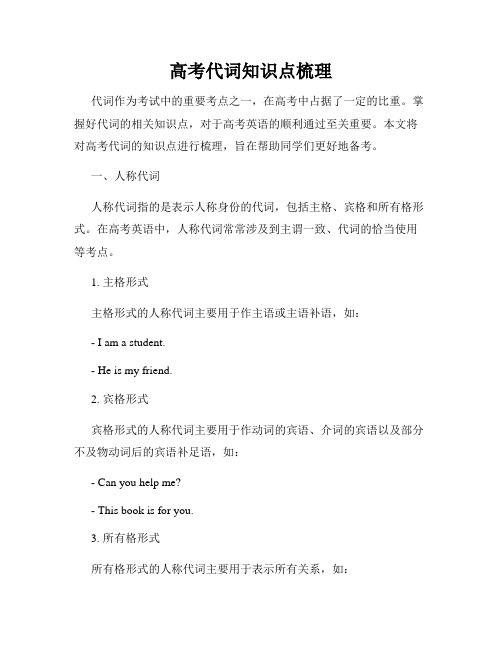
高考代词知识点梳理代词作为考试中的重要考点之一,在高考中占据了一定的比重。
掌握好代词的相关知识点,对于高考英语的顺利通过至关重要。
本文将对高考代词的知识点进行梳理,旨在帮助同学们更好地备考。
一、人称代词人称代词指的是表示人称身份的代词,包括主格、宾格和所有格形式。
在高考英语中,人称代词常常涉及到主谓一致、代词的恰当使用等考点。
1. 主格形式主格形式的人称代词主要用于作主语或主语补语,如:- I am a student.- He is my friend.2. 宾格形式宾格形式的人称代词主要用于作动词的宾语、介词的宾语以及部分不及物动词后的宾语补足语,如:- Can you help me?- This book is for you.3. 所有格形式所有格形式的人称代词主要用于表示所有关系,如:- This is my book.- Is that your pencil?二、指示代词指示代词用于指示特定的人或物,包括近指示代词和远指示代词。
在高考中,指示代词常涉及到考生对句子结构的理解和翻译能力。
1. 近指示代词近指示代词主要用于指示距离说话者较近的人或物,如:- This is my bag.- These are my friends.2. 远指示代词远指示代词主要用于指示距离说话者较远的人或物,如:- That is his car.- Those are their houses.三、相互代词相互代词主要用于表示两个或多个人或物之间的相互关系,常见的相互代词有each other和one another。
在高考中,相互代词常常涉及到对人际关系的描述和理解。
1. each othereach other用于表示两个人之间的相互关系,如:- They love each other.- The twins look exactly like each other.2. one anotherone another用于表示两个或多个人之间的相互关系,如:- The team members often help one another.- The students learn from one another.四、不定代词不定代词用于代替不具体指称的人或物,常常涉及到复数、单数、可数、不可数等概念的区分。
高考英语知识点代词归纳

高考英语知识点代词归纳高考英语知识点代词● one泛指一个人或物?其复数形式为ones one和the one作同位语时,如果与其同位的词语是特指,则用the one;如果是泛指,则用one,● that指代前面提到过的名词,常有后置定语 that的复数形式是those that可指代单数可数名词(= the one), 也可指代不可数名词,或指代前面提到过的一件事● it可指代前面提到过的一个名词,如例7;指代一件事,如例8;指代不明性别的婴儿或不明确的人,也可指代时间?天气?距离等0二、考查all, both, either, neither, none, no one的用法[考点解读]● both表示"两个人或物都",具有肯定含义; either表示"两者中的任何一个",如例13; neither表示"两者都不"高考英语必考重点句型句型1would rather that somebody did…"宁愿……;更愿意……"(表示现在或将来的愿望)would rather that somebody had done…"宁愿……;更愿意……"(表示过去的愿望)[例句]I'd rather you posted the letter right now. 我想让你现在去寄信。
I'd rather you were not a celebrated actor. In that case, we could spend more time together.我到情愿你不是个知名演员,这样我们可以有更多的时间在一起。
I'd rather that I hadn't seen her yesterday. 我情愿昨天没有看到她。
句型2as if/though+主语+did/had done…好像……(表示现在或将来的情况用过去时;表示过去的情况用过去完成时)[参考句型4][例句]Our head teacher treats us as if we were her own children, so all the students in our class think highly of her.Alan talked about Rome as if he had been there. Alan谈起罗马来就好像他去过那里似的。
高三英语一轮复习代词的语法复习课件
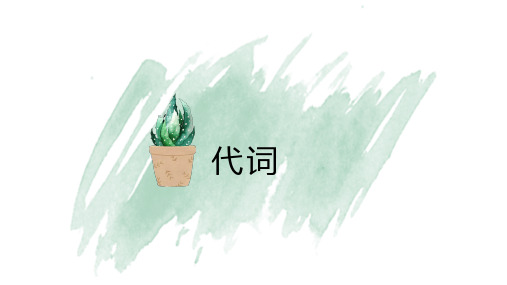
句法功能
3.作定语时须用所有格 The students borrowed each other's notes. 学生们互借笔记。
指示代词分单数(this/that)和复数(these/those)两种形式,既可作
限定词又可做代词。
例如: 1.限定词 This girl is Mary. 这个女孩是玛丽。
句法功能及用法
1.形容词性物主代词 形容词性物主代词一般位于名词前,用作定语,限定该名词的 意义 I like his car. 我喜欢他的小汽车。
John cut his finger. 约翰割破了手指。
句法功能及用法
2.名词性物主代词 (1)作主语
May I use your pen? Yours works better. 我可以用一用你的钢笔吗? 你的比我的好用。
2.代词 This is Mary. 这是玛丽。
Those men are my teachers. 那些人是我的老师。
Those are my teachers. 那是我的老师们。
句法功能
指示代词在句子中可充当主语、宾语、表语、定语。
1.主语 This is the way to do it. 这事儿就该这样做。
(3)作表语 The life I have is yours. It's yours. 我的生命属于你,属于你。
(2)作宾语 You may use my pen. I'll use hers. 你可以用我的笔,我用她的好了。
(4)与of连用 He is a close friend of ours. 他是我们的一位亲密朋友。
个”,作定语时可修饰可数或不可数名词。
They didn't have any friends here. 他们在这里没有朋友。
高三英语(课标全国卷)代词介词和介词短语

高三英语(课标全国卷)代词、介词和介词短语原卷版1. 掌握人称代词、物主代词、指示代词、不定代词、疑问代词、反身代词及it 的用法。
2. 掌握表示方位、时间、工具、手段、方式、原因等介词的基本用法。
3. 掌握常用动词、名词或形容词与介词连用构成的介词短语的用法.一、代词思维导图二、人称代词人称代词用来代替人或物,有人称、数和格的变化,其形式如下:1. 定义:人称代词是用来指代人、动物或事物的代词。
2. 用法:(1)通常主格作主语(在句首,动词前)。
(2)宾格作宾语(在动词或介词后)或作表语(在be动词后)。
三、物主代词1. 定义:物主代词是表示所有关系的代词,用来说明某物属于某人或与某人有关。
2. 分类:3. 用法(1)形容词性物主代词相当于形容词,只能放在名词前作定语,后面一定要跟一个名词。
(2)名词性物主代词相当于名词,后面不能加名词,可单独使用,可在句中充当主语、宾语、表语等。
相当于"形容词性物主代词+名词"。
四、反身代词1. 作宾语,表示动作的承受者就是动作的发出者,主语和宾语指同一个人或一些人。
He enjoyed himself in the wild.2. 作表语It doesn’ t matter. I’ll be myself soon.3. 作主语或宾语的同位语,意为"亲自"。
用于加强语气,可紧跟在被修饰名词后或句末。
She herself went to the school.(作主语同位语)You should ask the teacher himself. (作宾语同位语)4. 常用含反身代词短语:by oneself 亲自;独自enjoy oneself 玩得开心come to oneself恢复知觉dress oneself 自己穿衣服devote oneself to致力于speak to oneself 自言自语teach oneself 自学help oneself to 随便吃in oneself 本身固有occupy oneself in doing 忙于做某事五、介词思维导图六、表示时间的介词1.表示时间的介词at, on, in的用法①at表示在某一时刻或时间点。
高考英语语法
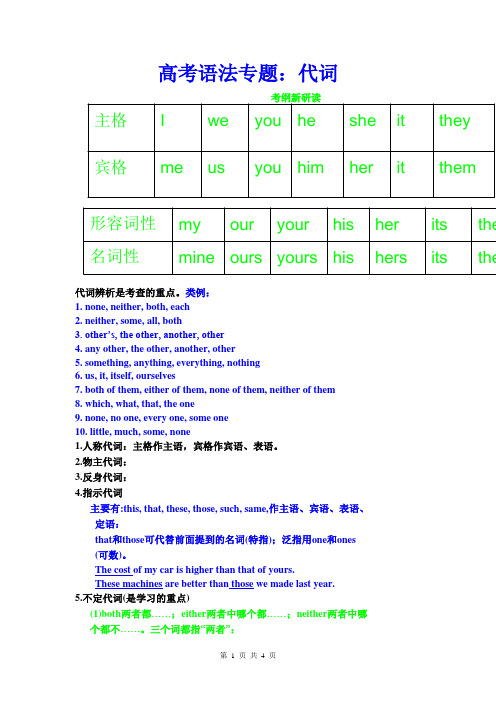
高考语法专题:代词考纲新研读代词辨析是考查的重点。
类例:1. none, neither, both, each2. neither, some, all, both3. other’s, the other, another, other4. any other, the other, another, other5. something, anything, everything, nothing6. us, it, itself, ourselves7. both of them, either of them, none of them, neither of them8. which, what, that, the one9. none, no one, every one, some one10. little, much, some, none1.人称代词:主格作主语,宾格作宾语、表语。
2.物主代词:3.反身代词:4.指示代词主要有:this, that, these, those, such, same,作主语、宾语、表语、 定语:that 和those 可代替前面提到的名词(特指);泛指用one 和ones (可数)。
The cost of my car is higher than that of yours.These machines are better than those we made last year.5.不定代词(是学习的重点)(1)both 两者都……;either 两者中哪个都……;neither 两者中哪 个都不……。
三个词都指“两者”:them it her him you us me 宾格 they it she he you we I 主格 theits hers his yours ours mine 名词性 the its her his your our my 形容词性Both of you are right.You may take either road.Either you are mad, or I am.(2)all 三者以上,或用作不可数:All that can be done has been done.部分否定:Not all ants go out for food.=All ants don’t go out for food.=Some ants don’t go out for food.并不是所有的蚂蚁都出去找食物。
高三英语语法复习(代词)

• other, others, the other, the others, another
• other表示泛指,常与复数名词或不可数名词连用; others表示泛指,相当于“other + 复数名词” • “the other+单数可数名词”特指两者中的另一 个,常有“one ...the other ...”一个„„另 一个„„的搭配 • 其复数形式the others或“the other +复数名 词”特指在某些人或物中,除去一部分后,“其 余的”或“剩下的”人或物 • another常用于三者或三者以上中的“另一个”, 表示泛指,后接单数名词,也可用于“another+ 数词+名词复数”。
名词性
反(自)身代词
mine
myself
yours
yourself
his, her, its
himself, herself, itself
ours
ourselves
yours
yourselves
theirs
themselves
指示代词
this, that
these. those
相互代词
不定代词
宾格
4. both…and…表示 “ 和……两个都” ,连接主语时谓语动
词是复数; either…or…表示“或……或”,neither…nor… 表示“既不……也不”;连接两个并列主语时谓语动词采用 就近原则,如: 1) Both Zhang and Wang are good students. 张、王都是好学生。 2) Either you or he is right. 不是你就是他对的。 3) Neither he nor I am a scientist. 他和我都不是科学家。
2024新高考英语复习(代词)

3.作表语 The winning numbers are those. 获奖号码是那些。 4.作宾语 I have no doubt about that. 我对那件事没有怀疑。
二、指示代词的用法 1.this,these往往指在时间或空间上较近的人或物;that,those可指在时间或 空间上较远的人或物。 例句
This picture was painted by Robert and that one by Bruce. 这幅画是罗伯特画的,那幅是布鲁斯画的。 I love these books but I don't like those(ones).我喜欢这些书,但不喜欢那 些。
2.that与those常用来代替上文已提到的名词,以避免重复。 例句 The climate of China is quite similar to that of the USA. 中国的气候和美国的气候很相似。 The days in summer are longer than those in winter.夏天的白天比冬天的白 天长。 3.打电话时,this指自己,that指别人。 例句 Hello! This is Alan. Who is that speaking? 喂!我是艾伦。您是哪位?
一、one/ones,the one/the ones作替代词时的用法 1.one:替代“a/an+单数可数名词” Mr. Rod prefers a restaurant in a small town to one in so large a city as Beijing. 与像北京这样大的城市里的饭店相比,Rod先生更喜欢小镇上的饭店。 2.ones:替代“零冠词+复数名词” Mr. Zhang gave me many valuable presents,ones that I had never seen.张先 生给了我很多珍贵的礼物,都是我从没见过的。
代词高考知识点总结大全

代词高考知识点总结大全一、代词的种类1. 人称代词:包括主格和宾格两种形式,主格用来作主语或表语,宾格用来作宾语。
例如:I(我)、you(你)、he(他)、she(她)、it(它)、we(我们)、they(他们)等。
2. 物主代词:用来表示所属关系,包括形容词性物主代词和代词性物主代词。
形容词性物主代词用在名词前,代词性物主代词则可以直接替代名词。
例如:my(我的)、your(你的)、his(他的)、her(她的)、its(它的)、our(我们的)、their(他们的)等。
3. 反身代词:用来指示动作的执行者同时也是动作的承受者,即“自己”。
例如:myself(我自己)、yourself(你自己)、himself(他自己)、herself(她自己)、itself(它自己)、ourselves(我们自己)、yourselves(你们自己)、themselves(他们自己)等。
4. 指示代词:用来指示人或物的特点或位置,包括人称和物主两种形式。
例如:this(这个)、that(那个)、these(这些)、those(那些)等。
5. 疑问代词:用来引导疑问句,可以代替名词或代词。
例如:who(谁)、whom(谁)、whose(谁的)、which(哪个)、what(什么)等。
6. 关系代词:用来引导定语从句,代替先行词并在从句中作某一句子成分。
例如:who (谁)、whom(谁)、whose(谁的)、which(哪个)、what(什么)等。
7. 不定代词:指代不特指的人或事物,没有明确的指示对象。
例如:somebody(某人)、anybody(任何人)、nobody(没有人)、something(某物)、anything(任何事物)、nothing(没有东西)等。
二、代词的用法1. 人称代词的用法:用作主语时,要和谓语动词的数保持一致;用作宾语时,要根据动词的情况选择宾格或者主格形式;用作表语时,要选择主格形式。
(完整版)高中英语代词

(完整版)高中英语代词代词可以分为下列九类1 人称代词(personal pronouns): I You She2 物主代词(Possessive Pronouns): My, His3 自身代词(self pronouns): myself4. 相互代词(reciprocal pronouns): one another, each other5. 指示代词(demonstrative Pronouns):this, that, those, these6. 疑问代词(interrogative pronouns): who, whom, whose, what, which用来构成特殊问句的。
7. 关系代词(relative pronouns): who, whom, whose, that, which等引导定语从句的。
8. 连接代词(conjunctive pronouns):疑问代词都可以用作连接代词,来引起主语从句,宾语从句和表语从句。
9 不定代词(indefinite pronouns): all, each, both等一人称代词人称代词做主语时用主格,做宾语时用宾格。
在作表语时,用宾格较多,例如:Who is knocking at the door? --- It’s me.但在强调结构中却常用主格:It was he who did it.It is she who wants this clothes.在使用人称代词时有下面几点值得注意:1)she可以用来代表国家,船只,大地,月亮等。
e.g. I think England will do what she promised to do.2) 在并列的主语中,I总放在最后。
e.g. Mary and I will be in charge of the case.3) 第三人称,男女两性并用时,男先女后。
He and she still don’t agree to the plan.二物主代词1.1)表语Whose dictionary is this? ----it’s mine.2) 主语Ours is a big family.3) 宾语Let’s clean their room first and ours later.2. “of +名词性物主代词”可用作定语That car of hers is always breaking down.= Her car is …….三11)作宾语I can’t express myself in English.2) 作表语I am not quite myself these days. 我近来身体不大舒服。
高三英语语法专题三 代词一、代词分类如下
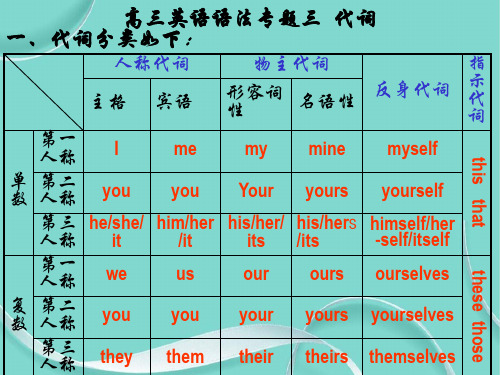
have _o_n__e_ . Mr Zhang gave the textbooks to all the pupils except
_t_h_e_o__n_e_s_/_t_h_o_s_e__ who had already taken them.
2. The criminal turned out to be __h_e__.(he / him) 3. Somebody had given the money to the poor girl. I
didn’t consider it to be_h_i_m__ , though it was generally thought to be _h__e__ . But finally it proved to be really _h_e___.(he / him) 4. W__h_o_m__ do you suppose me to be ? (who / whom) 5. _W__h_o_ am I supposed to be ? (who / whom) 6. It appears to have been __h_e__. (he / him)
and they.若承认错误或承担责任,顺序应为:I,he and you。 e.g.You, he and I have all seen the film twice.
I and she are to blame. 注: you and I是固定结构,即使是在承担过失时,词
序也不变。 e.g.You and I are to blame. 另外:You,he and I will all have to answer for the fire. 2.人称代词的宾格代替主格的几种场合 (1)在日常生活中,人称代词作表语时,常用代词的
代词 课件 2023届高考英语语法总复习

知识3 反身代词
1.反身代词可作宾语:常在 enjoy, teach, hurt, behave, introduce(介 绍)等动词后作动宾和by, for, to, in, of等介词后作介宾。 ►He is teaching himself English. ►She was talking to herself. 2.反身代词可作同位语:用于加强语气,强调"亲自,本人,亲身"。 ►He himself went to the bank. 3.反身代词可作表语:常用于be, feel, look, seem等系动词后作表语,表 示身体或精神状态。 ►I'm not myself today. ►I am feeling myself again.
知识5 some和any
some常用于肯定句,any则常用于否定句和疑问句。 ►Some of the milk has gone bad. ►I need some stamps. Are there any in your bag? 特别提醒 any还可用于肯定句,表示"任一"。 ►I'll take any you don't want.
知识2 物主代词
物主代词可分为形容词性物主代词和名词性物主代词。 1.形容词性物主代词相当于形容词:置于名词之前,作定语,不可单独使用。 ►Those people are my schoolmates. 拓展延伸 含形容词性物主代词的常用结构: 1.形容词性物主代词+own(+名词) 某人自己的(……) ►I have my own room. ►I need a room of my own. 2.形容词性物主代词+v-ing,可作主语或宾语 ►His being ill made his mother worried.
高考英语复习 专题09 指示代词备考策略-人教版高三全册英语素材

代词主标题:代词副标题:代词――指示代词重要度:3(共分5等)难度:1(共分5等)内容:指示代词:【定义】:是用来指示或标识人或事物的代词。
【指示代词】有this, that, these, those, such, so等。
一般分单数(this / that)和复数(these / those)两种形式。
它们在句中既可用作代词,也可用作形容词。
一般说来,this, these表“近指”,,而that, those则“远指”。
【常考点】:1.指示代词指上文还是指下文。
指上文提到的事多用that,有时用this,指下文的事只能用this。
而且that一般代指上文中出现的可数名词单数或者不可数名词;those代指上文中出现的可数名词复数。
有时会结合一些其它代词来综合考察,以增加试题的迷惑性和难度。
这些考察在完形填空和改错题中最为常见。
例1:(15陕西卷)The cost of renting a house in central Xi’an is higher than ____ in any other area of the city.A. thatB. thisC. itD. one【答案】A。
【试题分析】这是一道综合性的考题,考查代词的用法,难点在于把考点放在了比较状语从句中。
【解析】所填词用于比较状语从句中, 指代句子的主语cost, 即指代不可数名词, 用that。
This指代下文即将提到的事物;it指代“同一物”;one指代“同类中的一个”之意。
2.指示代词such代指前面的人或事,它具有名词和形容词的性质,一般在句中作主语,表语,宾语或定语。
用做主语是,谓语动词的单复数取决于后面的名词或代词;用作定语时,它所修饰的名词前的不定冠词应放在之后,即such+a/an+形容词+可数名词单数。
例2:_____ is the power of TV that it can make a person suddenly famous.A.SuchB.SoC.ThatD.This【答案】A【试题分析】 Such是指示代词,在句子作主语。
高考英语语法代词详解

代词高考对代词的考查主要是人称代词、物主代词、反身代词、指示代词、不定代词、疑问代词和关系代词等;设置特定的语境,对代词的数、性、格的变化进行考查仍然是高考的热点;Ⅰ代词的分类1.人称代词:主格I, we, you, he, she, it, they宾格me, us, you, him, her, it, them2.物主代词:形容词性my, our, your, his, her, its, their名词性mine, ours, yours, his, hers, its, theirs3.反身代词:单数myself, yourself, himself, herself, itself复数ourselves, yourselves, themselves4.相互代词:each other 两者之间相互;one another 两者以上的相互5.指示代词:this, that, these, those6.疑问代词:who, whom, whose, which, what7.关系代词:who, whom, whose, that指人,which, that, as, whose 指物8.不定代词:all, each, either, neither, both, none, other, another, something, everything, nothing somebody, everybody, nobody someone, everyone, no one, many, much, few, less一、人称代词单数复数第一人称第二人称第三人称第一人称第二人称第三人称人主I you he,she,itwe you they称代词格宾格me you him,her,itus you them人称代词的用法1.人称代词的主格在句子中作主语或主语补足语;如:John waited a while but eventually he went home.约翰等了一会儿,最后他回家了; John hoped the passenger would be Mary and indeed it was she.说明:在复合句中,如果主句和从句主语相同,代词主语要用在从句中,名词主语用在主句中;When he arrived,John went straight to the bank.约翰一到就直接去银行了;2.人称代词的宾格在句子中作宾语或介词宾语,但在口语中也能作主语补语,第一人称在省略句中,还可以作主语;如:I saw her with them;at least,I thought it was her.第一个her作动词宾语,them作介词宾语,第二个her作表语—Who broke the vase谁打碎了花瓶—Me.我;3.人称代词之主、宾格的替换1宾格代替主格在简短对话中,当人称代词单独使用或在not 后,多用宾语;—I like English.;—Me too.—Have more wine—Not me.;在表示比较的非正式的文体中,常用宾格代替主格; 但如果比较状语的谓语保留,则主语只能用主格;He is taller than I/me. He is taller than I am.2主格代替宾格在介词but,except后,有时可用主格代替宾格;在电话用语中常用主格;—I wish to speak to Mary.;—This is she.注意:在动词be 或to be后的人称代词视其前面的名词或代词而定;I thought it was she.我以为是她;主格——主格I thought it to be her.宾格——宾格I was taken to be she.我被当成了她;主格——主格They took me to be her.他们把我当成了她;宾格——宾格4.代词的指代问题1不定代词anybody,everybody,nobody,anyone, someone, everyone,no one, 及whoever和person在正式场合使用时,可用he,his,him代替;如:Nobody came,did he2动物名词的指代一般用it或they代替,有时也用he,she,带有亲切的感情色彩;如:Give the cat some is hungry.;3指代车或国家,船舶的名词,含感情色彩时常用she;5.并列人称代词的排列顺序1单数人称代词并列作主语时,其顺序为:第二人称→ 第三人称→第一人称,即you→ he/she; it → I;如:You,he and I should return on time.你,他还有我应该按时回来;2复数人称代词作主语时,其顺序为:第一人称→ 第二人称→第三人称,即we→you→they;在下列情况中,第一人称放在前面;在承认错误,承担责任时;It was I and John that made her angry.是我和约翰惹她生气了;在长辈对晚辈,长官对下属说话时,如长官为第一人称,如:I and you try to finish it.并列主语只有第一人称和第三人称时;当其他人称代词或名词被定语从句修饰时;二、物主代词物主代词是表示所有关系的代词,也可叫做代词所有格;物主代词分形容性物主代词和名词性物主代词两种,其人称和数的变化见下表;单数复数第一人称第二人称第三人称第一人称第二人称第三人称物主代词形容词性my your his,her,its our your their名词性mine your shis,hers,its ours yours theirsOur school is here,and theirs is there.我们的学校在这儿,他们的在那儿;1.物主代词的用法1物主代词既有表示所属的作用又有指代作用;如:John had cut his finger; apparently there was a broken glass on his desk.2物主代词有形容词性my,your等和名词性mine,yours等两种,形容词性的物主代词属于限定词;名词性的物主代词在用法上相当于省略了中心名词的’s属格结构;如:Jack’s cap意为The cap is Jack’s;His cap意为The cap is his;2.名词性物主代词的句法功能1作主语;如:May I use your pen Yours works better.2作宾语;如:I love my motherland as much as you love yours.3作介词宾语;如:You should interpret what I said in my sense of the word,not inyours.4作表语;如:The life I have is ’s ’s yours.3.双重所有格物主代词不可与a,an,this,that,these,those,some,any,several,no,each,every,such,another,which等词一起前置,修饰一个名词,而必须用双重所有格;公式为:a,an,this,that+名词+of+名词性物主代词;三、指示代词指示代词表示“那个”“这个”“这些”“那些”等指示概念的代词;指示代词有this,that,these,those等;如:That is a good idea.指示代词的用法1.指示代词分单数this/that和复数these/those两种形式,既可作限定词又可作代词;2.指示代词的句法功能;1作主语;如:This is the way to do it.2作宾语;如:I like this better than that.3作表语;如:My point is this.4作介词宾语;如:I don’t say no to that.There is no fear of that.说明1:指示代词在作主语时可指物也可指人,但作其他句子成分时只能指物,不能指人;如:对That is my teacher.那是我的老师;that作主语,指人对He is going to marry this girl.他要和这个姑娘结婚;this作限定词错He is going to marry this.this作宾语时不能指人对I bought this.我买这个;this指物,可作宾语说明2:that和those可作定语从句的先行词,但this和these不能,同时,在作先行词时,只有those可指人,试比较:对He admired that which looked beautiful.对He admired those who looked beautiful.他赞赏那些外表漂亮的人;those 指人错He admired that who danced well.that 作宾语时不能指人对He admired those who danced well.他赞赏跳舞好的人;those 指人对He admired those which looked beautiful.他赞赏那些外表漂亮的东西;those指物四、反身代词表示“我自己”“你自己”“他自己”“我们自己”“你们自己”和“他们自己”等的代词,叫做自身代词,也称为“反身代词”;如:She was talking to herself.她自言自语;反身代词单数复数第一人称第二人称第三人称第一人称第二人称第三人称myself yourself himselfherselfitselfourselves yourselves themselves反身代词的用法1.作宾语,如1有些动词需有反身代词,如absent,bathe,amuse,blame,dry,cut,enjoy,hurt,introduce,behave等;如:We enjoyed ourselves very much last night.Please help yourself to some fish.2用于及物动词+宾语+介词,如:take pride in,be annoyed with,help oneself to sth 等;I could not dressmyselfup at that time.注:有些动词后不跟反身代词,如:get up,stand up,wake up等;Please sit down.2.用作表语;如;I am not myself today.3.用作同位语;如The thing itself is not important.4.在不强调的情况下,but,except,for 等介词后宾语用反身代词或人称代词宾格均可;注意:1反身代词本身不能单独作主语;错Myself drove the car.对I myself drove the car.我自己开车;2但在and,or,nor连接的并列主语中,第二个主语可用反身代词,特别是myself 作主语;Charles and myself saw it.查尔斯和我看见了这件事;五、相互代词表示相互关系的代词叫相互代词,有each other和one another两个词组;他们表示句中动词所叙述的动作或感觉在涉及的各个对象之间是相互存在的;如:It is easy to see that the people of different cultures have always copied each other.,相互借鉴的相互代词宾格each other,one another所有格each other’s,one another’s相互代词的句法功能1.作动词宾语;如:People should love one another.人们应当彼此相爱;2.可作介词宾语;Dogs bark,cocks crow,frogs croak to each other.犬吠、鸡鸣、蛙儿对唱;说明:传统语法认为,相互关系存在于两个人或物之间用each other, 存在于两个以上人和物之间用one another;现代英语中,两组词交替使用的实例也很多;He put all the books beside each other/one another.他把所有书并列摆放起来; Usually these small groups were independent of each other.这些小团体通常是相互独立的;3.相互代词可加’s构成所有格;如:The students borrowed each other’s notes.六、不定代词不是指明代替任何特定名词的代词叫做不定代词;常见的不定代词有all,both,each,every等,以及含有some,any,no等的合成代词,如anybody,something,no one;这些不定代词大都可以代替名词和形容词,在句中作主语、宾语、表语和定语,但none和由some,any,no等构成的复合不定代词只能作主语、宾语或表语;every 和no只能作定语;如:—Do you have a car— Yes,I have one.—I don’t know any of them.他们,Ⅱ代词的用法1. nothing, none, no onenone作为代词,最常用来表示数量,它可以是一个可数的概念how many也可以是一个不可数的概念how much,或者any引起的问题;而nothing是相对于something有某物什么都没有,它回答的是“What is in/on...”的问题;而no one=nobody没有人,它回答的是“Who did that”谁……或是anyone有没有人的问题;2. one, ones, that, those, it1one和ones可以用来代替前面提到过的可数名词,one代单数,ones代复数,其中:两者都可以指代物只要是可数one前面一般不加a,因为它本身有“一个”的意思,但如果one前面有形容词修饰,则需要加a/an;one可以单独使用,意思为“任何人”;例如:—Shall we have a rest—Didn’t we just have one因为one=a somethingOne should always believe in oneself.2that与those:that可以代替前面提到的不可数名词或可数名词单数相当于the one;而those 代替前面提到的复数名词,有时可以用the ones替换;例如:The population of China is bigger than that of India. that=the populationThe boy told his story and that of the girl next room.that=the storyThe cell phones we made nowadays are better than those/the ones made 2 years ago.those=the cell phones=the ones3one和it:两者都可以用来代替前面出现过的单数名词,one指这类东西中的任何一个,指类属,泛指;it指前面所指的同一物;例如:I need a pen to sign my name. Can I have one one =a pen I cannot find my new pen. Have you seen itit指那支新钢笔3. another, the other, other, others, the others1another和the other:两者都是“另一个”的意思,但数量上有区别:用another指两个以上的数量,而the other只指两个中的另一个,例如:He has three brothers, one is a teacher, another is a doctor and the third is an engineer.注:another除了可以作代词,还可以用作形容词;这里有必要区别another, the other和more的用法:①another:another表“另一个”时只跟可数名词单数,而表“另外的、额外的、附加的”时,可跟带有few或具体数字的复数名词,此时可把“数词+复数名词”看作是一个整体;例如:—Have you finished your report yet—No,I will finish it in another 10 minutes.There is room for another few people in the back of the bus.②other:表“另外的”接复数名词,如与具体数词连用,则置于数词之后,但与定冠词the连用时,other要放在数词前;例如:Tony is going camping with two other little boys next Sunday.Do you know where he found the other two photos③more:more一般位于数词之后,名词之前,有时也可置于名词之后;例如:One more stepOne step more,and I’ll shoot you.Where shall we be in ten more yearsmore除跟数词外,还可与many, a little,a few,a lot,several等词连用,例如:There are many more dictionaries on the desk.Would you like some more tea2 others, the othersothers是相对于some来说的:some...some....others... 一些……一些……另一些……是泛指;而the others是特指另一些,相对于ones 可以理解为one, the other 的复数;例如:Class 1 are cleaning the classroom. Some are sweeping the floor, some are cleaning the window, and others are washing the blackboard. 泛指There are only 20 students in the classroom, where are the others.特指4. both, other, neither, each, any, allboth:两者都,谓语动词用复数;either:两者中间的任何一个,谓语动词用单数;neither:两者中间无任何一个,谓语动词多用单数,也可以用复数;each:两个或两个以上中的每一个,谓语动词用单数;any:三者或三者以上中的任何一个,谓语动词用单数;all:三者或三者以上全部;5. some, any, nosome属于肯定词,主要用于肯定句中,但当说话人期待肯定回答时,也可以用于疑问句中;例如:Could I have some more tea, please Would you like some more coffeeany属于非肯定词,主要用于否定句、疑问句或条件句中;它可以与形容词的比较级连用;例如:Don’t come any closer,or I’ll shootno属于否定词,用于否定句中:no+可数名词单数=not a/an no+可数名词复数=not any;例如:There is no such thing as a free lunch in the world.考点诠释纵观历年高考试题,代词的主要考点主要集中在以下几个方面:不定代词one,the one,ones,the ones;物主代词的用法;人称代词主格和宾格的用法;表示两者和多者的不定代词的比较;指示代词this,that,these,those,it的用法;another,theothers,else;the rest的用法;every-,some-,any-,no-与-thing,-one,-body构成的复合不定代词的用法;考点1 人称代词一般地说人称代词作主语时用主格;作宾语时用宾格;作定语时用形容词性物主代词;名词性物主代词可以代替“形容词性物主代词+名词”;但口语中,在无动词的句子里,往往用代词的宾格形式;1.用于无谓语的句子中一Dpes any of you know why Jack hasn’t come yet一Me.;答语如果带谓语,就得用主格,如:I can.和I do,too./So do I.2.表示惊奇、猜疑、反问、不满、厌烦等①Do you have good eyesight,young man一MeI can see a sparrow two hundred paces away.②WhatMe fight a big chap like himNot me3.代替as,than等连词之后的主格多用于口语中,尤其用于句末①I’m not as tall as himhe.;②She is much more careful than meI.她比我细心得多;当这类人称代词带有all,both等同位语时,用宾格的形式就更为常见了;如:He works harder than us a11.典例:Our neighbers gave a baby bird yesterday that hurt when it fell from its nest. A.us;it B.us;itself C.ourselves;itself D.ourselves;it考点2指不代词1.this/these,that/thosethis,these指代下面要说的内容;that,those指代上面陈述过的内容;如:①What I’d like to say about how to improve our spoken English is like this.②That’s a11.Thank you.③Salaries are higher here than those inmy hometown.2.一些习惯说法中this和that的用法比较固定①Who’s that你是谁②This is Mary.③11at’s all right/OK.;对感谢的答语④nat’S nothing.;对道歉的答语‘⑤That’s that.表示决定不能更改⑥That’S a11.就这些了;⑦That is…那就是……3.this,that有时可以用作副词,意为“这么,那么”,用在形容词或副词前作状语,表示程度It isn’t that cold.还没那么冷;考点3不定代词以下是几组易混不定代词:1.some类不定代词与any类不定代词1some类不定代词多用于肯定句中;any类的多用于疑问句、否定句和条件状语从句中;如:Raise your hands if you have any questions.如果你们有问题,请举手;2但在表示客气的请求或希望对方给予肯定回答的疑问句中,要用some类的不定代词;如:Would you like something to drink你要喝点什么吗3any类的不定代词用在肯定句中,表示“任何一个;任何事情;无论什么”;如:She promised that she could do anything for you.她许诺能为你做任何事情;2.all,both,neither,none1all指三者或三者以上“都”,both指两者“都”;如:①Bothofhis hands were wounded.②Allofhis fingers were wounded.2neither表示“两个都不”,常和of连用,放在带有冠词、物主代词或指示代词的复数名词之前,作主语时,谓语动词可以用单数或复数;none表示三个或三个以上“都不”,可用于人,也可用于物,后可接of短语,与复数名词、代词或单数集合名词连用作主语,指人时,谓语动词用单、复数皆可;指物时,只用第三人称单数形式;如:①Neither of the twins is/are cor rect.②None of us has/have ever been to the Great wall.3.any,either,each,every1any一般用于否定句、疑问句和条件句中;也可用在肯定句中,以加强语气,表示“任一”的概念;还可以用来修饰可数名词单数,表示三者或三者以上中的“任何一个”;如:I didn’t eat any meat.我一点儿肉也没吃;4.no,none,nothing,nobody1no不能单独使用,相当于not a或not any,作定语修饰可数名词或不可数名词;如:You have no sympathy for the sufferings of others.你对别人的痛苦没有同情心;2none既可以指人,也可以指物,侧重指三者或三者以上的人或物,用于回答how many/much引导的疑问句,可与介词of连用;如:①None of the books is suitable for the young.这些书都不适合年轻人读;②一How many people are there in the room一None.没人;3nobody指人,用于回答who引导的疑问句;nothing指物,用于回答what引导的疑问句;如:一Who is in the room谁在屋内一Nobody.没有人;5.it,one,ones, that和those1it特指上文所提到的同一个物,它所代替的名词常由the,this,that等修饰;one指上文提到的同类事物中的一个,不特指,被指代的名词通常由不定代词some或any修饰;如:①Where is that bookI can’t find it.那本书在哪儿我找不到它;②I haven’t got any erasers.Will you please give me one我没有橡皮,请你给我一块好吗(2)one与that都可用来代替上文中出现的名词,one前要用定冠词the,有时that和the one可互换使用;如:The book isn’t so interesting as the one/that you borrowed.3但that和one在多数情况下是不能互换的,主要区别在于:that既可代替可数名词,也可代替不可数名词,常要求有后置定语,一般不指人,复数形式为those;one只能代替可数名词单数,复数形式为ones;当可数名词前有形容词修饰时,只能用one,不用that;当of短语作可数名词的后置定语时,用that,不用one;如:①The best cigarettes are those from Yunnan.②The boy told me his story and that of the girl next door.Your coat is blue,and my new one is green.你的大衣是蓝色的,我的新大衣是绿色的;4the ones用来代替上文提到的特指的复数名词,有时可以用those代替,尤其在有后置定语的情况下;如:The books on the desk are better than those/the ones under the desk.6.another,other,others,more1another既可以单独使用,也可以用于单数名词前,泛指三者或三者以上中的“另外一个人或物”;还可以用“another+数量词+复数名词”,表示”再,又”;如:①was there another way out②we’d better wait another five minutes.特别提示表示“另外一个学生”只能用another student,不能说成another one student;2other不能单独使用,应用于复数名词前,表示另外的某些人或物,也可以用在some,any,no之后,或具体数词之后,再接名词,构成”不定代词或具体数词+other+名词”;接单数名词时,还可以用在冠词the后,特指两个人或物中的另外一个可以省略为the other,或特指另外的某些人或物可以省略为theothers,others泛指”其他的事物,别人”;如:Done remained and the other went away.②We should learn to treat others as equals.7.something,anything,everything,nothing1something一般用在肯定句中,也可以用在表示邀请、征询意见的委婉问句中;如:Could you do something for me请为我做点事好吗(2)anything用在否定句、疑问句或条件句中;如:There isn’t anythinginside.3everything意为”一切事物”,可用在肯定句或疑问句中;用于否定句时,表示部分否定;表示全部否定时要用nothing或not anything;如:Everything is good when new,but friends when old.东西是新的好,朋友是老的亲;谚语4nothing表示”什么也没有”,常用于陈述句,表示否定意义,不能与否定词连用;如:①Do nothing by halves.凡事不可半途而废;谚语②Fools learn nothing from wise men,but wise men learn much from fools.愚者不学无术,智者不耻下问;谚语典例1:2010高考英语江西卷,27Swimming is my favorite sport. There is _______ like swimming as a means of keeping fit.A somethingB anythingC nothingD everything答案C解析考查不定代词;句意:游泳是我最爱的运动;再没有比游泳更好的锻炼方式了;There is nothing like…意即”没有什么能像……了”;典例2:2009陕西Jane was asked a lot of questions,but she didn’t answer of them.A.other B.any C.none D.some典例3:2009江苏Nine in ten parents said there were significantdifferences in their approach to educating their children compared with of their parents.A.those B.one C.both D.that解析D 句意:十分之九的家长认为他们教育孩子的方法和他们父母的教育方法有明显的差别;在同一句话中,指代的名词和前面提到的名词是同一类,即同名异物,要用that;考点4 反身代词1.反身代词在句中可以作宾语、表语、并列主语,以及名词、代词的同位语①The text itself is very easy.作主语的同位语②EitherJane or yourselfwill go there.;作并列主语,但不能单独作主语③He is not laughed at that laughs at himself first.谚自嘲者不会让人嘲笑; ④Respect yourseff,or noone else will respect you.谚要人尊敬,必须自重;2.主语与宾语是同一个人时,应当用反身代词teach oneself,enjoyoneself,help oneself,throw oneself,look after oneself3.在系动词后作表语,常用于否定句,表示身体不适I don’t know what’S the matter with me.I’m not myself today.4.用在交际英语中①Help yourseff②Make yourself at home③Don’t upset yourself5.辨别几组搭配by oneself独自for oneself独自地,靠自己的力量;of oneself~t动地;to oneself独占,典例:Isn’t it amazing how the human body heals after an injuryA.hireself B.him C.itself D.it考点5 it的用法在英语中,运用it的场合较多;从它在句中的作用和意义来看,it的用法可分为三类:1.指代作用1用作人称代词,代替前文或后文所提到的同一事物单数可数名词或不可数名词;如:Although we cannot see it,there is air all around us.(2)代替前面的整个句子;如:It is said that he has died of a disease,but it isn’t true.3用在答语中代替指示代词this,that;如:一What is this这是什么一It’s a bike.4代替不能或没有必要区分性别的或某些习惯说法中的人;如:①The baby cried because it Was hungry.婴儿哭是因为饿了;婴儿习惯上不区分性别②一Who is knocking at the door 一It’s me.5指环境、情形等;如:①I can’t stand it any longer.我再也不能容忍这种情况了;②Take it easy.别紧张;6指度量衡单位、时间、距离、季节、天气及自然现象;如:①It’s getting colder and colder now.现在越来越冷了;②It is winter now.现在是冬天了;2.形式作用1形式主语当动词不定式、形式或从句作主语时,通常把它们放在谓语之后,而用it作句子的形式主语;如:IIt’s no use crying over spilt milk.谚覆水难收;②It takes three generations to make a gentleman.谚十年树木,百年树人;2形式宾语当复合宾语中的宾语是不定式、v-ing形式或宾语从句时,往往把真正的宾语放在补足语后面,而用it作形式宾语,放在宾语补足语之前;如:①You must make it clear to them that the situation is serious.②They thought it difficult to talk to the guests about the recent events.特别提示形式宾语用在“主语+谓语动词+宾语”结构中,谓语动词appreciate,dislike,hate,like,love,make按时到达,成功等后接由if或when等引导的从句时,往往在从句前加形式宾语it;如:①1 would appreciate it if you paid in cash.如果你能支付现金的话,我会不胜感激;②The boy likes it when you do that.那个男孩喜欢你那样做;3.强调作用it可以用来改变句子的结构,使句子的某一成分得到强调;强调句型的基本结构为:It is/was+所强调的成分+that/who/whom+其他成分;高考链接1If our parents do everything for us children, we won't learn to dependonA. themselvesB. themC. usD. ourselves答案D主语为we,因此应为ourselves. depend on oneself:自力更生;2. 2010高考英语重庆卷,23He had lost his temper and his health in the warand never found of them again.B. eitherC. eachD. allA.neither答案 B;由his temper and his health可以排除CD,由后面的never表否定,选either,never/not either是全部否定,相当于neither;3. that’s import ant is that you are doing your best and moving inthe right direction.A.One B.All C.EverythingD.AnythingB此处All that's important相当于What's important,在主句中作主语,表示“重要的是……”4. 2010高考英语天津卷,6in my life impressed me so deeply as my first visitto the Palace Museum. A. Anything B. Nothing C.Everything D. Something5.2010高考英语四川卷,7On my desk is a photo that my father took ofwhen I was a baby. A. him B. his C. meD. mine答案Ctake a photo of sb意为给某人照相,此处应用人称代词的宾格;is said that two man-made structures are clearly visible from space. One is the Great Wall of China, and is Japans Kansai InternationalAirport.A.another B.other C.the other D.either 答案C;两者中的一个用one,两者中的另一个用the other,上句有提示twoman—made structures,所以用one…the other结构;7.The cost of renting a house in central Xi’an is higher than ____ in anyother area of the city. A. that B. this C. it D. one 答案A在西安市中心租一套房子的费用比在该市任何其他地区租一套房子的费用都要高;根据句意可知,空处指代The cost of renting a house,应该用that;8.Helping others is a habit, _______ you can learn even at an early age.A. itB. thatC. whatD. onefact that she was foreign made _____difficult for her to get a job in that country A so B. much C. that D. it 答案D题干中含有make it difficult for sb to do sth结构;形式宾语it代替后面的动词不定式短语to get a job in that country;is my favorite sport. There is _______ like swimming as a means of keeping fit.A somethingB anythingC nothing Deverything答案C句意:游泳是我最爱的运动;再没有比游泳更好的锻炼方式了;There is nothing like…意即”没有什么能像……了”;11When you introduce me to Mr. Johnson, could you please say for meA. everythingB. anythingC. somethingD. nothing答案 C;A项意为:“每件事”,B项意为“任何事”;C项意为“某事”;D项意为“没什么”;句意为:“当你把我介绍给约翰逊先生时,请为我说话吧;”something用在问剧中表示建议或请求,期望得到肯定或者所问问题可能性很大时;12.'ll spend half of my holiday practicing English and halflearning drawing.A. anotherB. the otherC. other’sD. other答案B句意:假期我会把一半时间用于练习英语,另一半用于学习绘画;half表示“一半”,the other half表示“另一半”;the other指两个事物中的“另一个”;13The doctor thought ____ would be good for you to have a holiday.A. thisB. thatC. oneD. it14.Neither side is prepared to talk to _____ unless we can smooth thingover between them;A. othersB. the otherC. anotherD. one other答案 B句意为:“双方都不准备和对方交流,除非我们能做一些调停的事情;”首先注意本句的Neither说明问题是出在两个对立方,而双方不打算作出让步,所以这里选B,the other指两者中的另一方;而another指的三者或三者以上;others 是针对两大类人的,常与some对应,没有one other的说法;15You are a team star Working with is rally your cup of tea.A. both B.either C. others D.the other答案:参考答案:1-5 ADAAB 6-10 CBAAC 11-15 BACCB 16-20 BBBDD 21-25 DCCCB 26-30 DCBAD 31-35 CCABA 36-40 ADBCB41-45 CCDBD 46-50 CADAC 51-53 CCB。
高三英语一轮复习语法专题三代词课件

单数 复数
一本/一些书
另外一个/一些书 剩余的一本/一些书
one book another book the other book
some books other books
the other books
2. many,much,few,little,a few, a little的区别
多
少
复数名词概念 many
any
anyone anybody anything
no
none/no one nobody
no;
复合不定代词作主语,谓语动词用单数
四、反身代词
单数 复数
第一人称 第二人称 第三人称 himself,
myself yourself herself, itself
替代
one
a/an+单数名词
ones
零冠词+复数名词
the one
the+单数名词
the ones that those
the+复数名词
the+单数名词或不可数名词(尤其是 有后置定语时)
the+复数名词(尤其是有后置定语时 )
教学质量提升是一项系统工程,涉及到多个方面、各个维度,关键是要抓 住重点、以点带面、全面突破,收到事半功倍的效果。
英语 一、英语听力:要坚持每天听1、调整并保持听力状态很重要。建议考前, 考生要保持每天20分钟的听力练习量。 2、真题最好反复演练。最后的30天,主要应该听去年各省市的高考听力试 题和仿真度比较高的今年各市一模、二模试题。 3、听写训练。做一些真题的听写训练。基本方法,先整体听一遍,然后听 一句写一句,坚持听写完为止,然后再对照原文,检查自己错在哪里。另外值 得一提的是,在正式考试中,做完所有听力20道选择题后,一般来说,没有百 分之百的把握,不要轻易改动第一次做好的答案。据统计,第一次选择往往比 改动后的选择更可靠。
高三英语:代词it, one, ones, that, this, those, the one 的用法
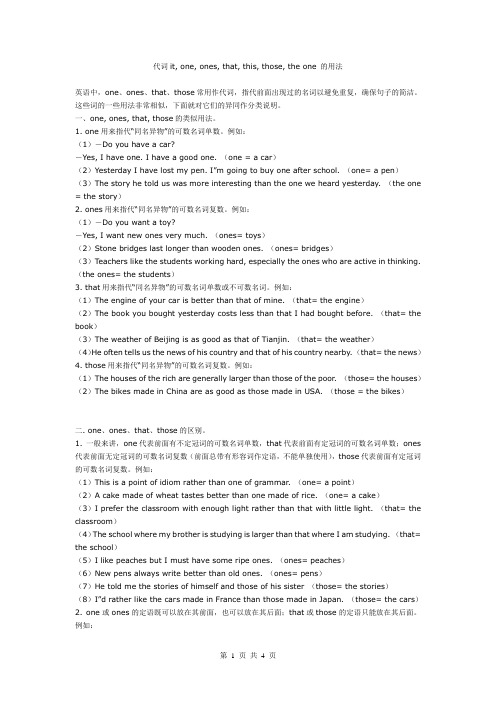
代词it, one, ones, that, this, those, the one 的用法英语中,one、ones、that、those常用作代词,指代前面出现过的名词以避免重复,确保句子的简洁。
这些词的一些用法非常相似,下面就对它们的异同作分类说明。
一、one, ones, that, those的类似用法。
1. one用来指代“同名异物”的可数名词单数。
例如:(1)-Do you have a car?-Yes, I have one. I have a good one. (one = a car)(2)Yesterday I have lost my pen. I”m going to buy one after school. (one= a pen)(3)The story he told us was more interesting than the one we heard yesterday. (the one = the story)2. ones用来指代“同名异物”的可数名词复数。
例如:(1)-Do you want a toy?-Yes, I want new ones very much. (ones= toys)(2)Stone bridges last longer than wooden ones. (ones= bridges)(3)Teachers like the students working hard, especially the ones who are active in thinking. (the ones= the students)3. that用来指代“同名异物”的可数名词单数或不可数名词。
例如:(1)The engine of your car is better than that of mine. (that= the engine)(2)The book you bought yesterday costs less than that I had bought before. (that= the book)(3)The weather of Beijing is as good as that of Tianjin. (that= the weather)(4)He often tells us the news of his country and that of his country nearby. (that= the news)4. those用来指代“同名异物”的可数名词复数。
【帮帮群】高三英语语法复习讲座---代词的用法 (1)
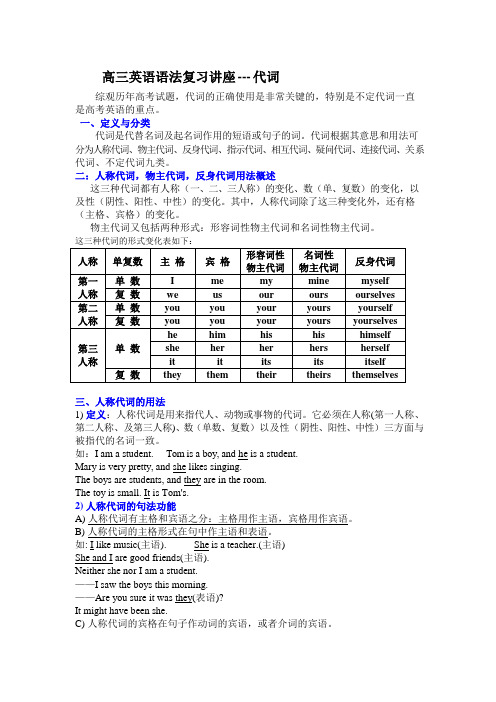
高三英语语法复习讲座 --- 代词综观历年高考试题,代词的正确使用是非常关键的,特别是不定代词一直是高考英语的重点。
一、定义与分类代词是代替名词及起名词作用的短语或句子的词。
代词根据其意思和用法可分为人称代词、物主代词、反身代词、指示代词、相互代词、疑问代词、连接代词、关系代词、不定代词九类。
二:人称代词,物主代词,反身代词用法概述这三种代词都有人称(一、二、三人称)的变化、数(单、复数)的变化,以及性(阴性、阳性、中性)的变化。
其中,人称代词除了这三种变化外,还有格(主格、宾格)的变化。
物主代词又包括两种形式:形容词性物主代词和名词性物主代词。
这三种代词的形式变化表如下:三、人称代词的用法1)定义:人称代词是用来指代人、动物或事物的代词。
它必须在人称(第一人称、第二人称、及第三人称)、数(单数、复数)以及性(阴性、阳性、中性)三方面与被指代的名词一致。
如:I am a student. Tom is a boy, and he is a student.Mary is very pretty, and she likes singing.The boys are students, and they are in the room.The toy is small. It is Tom's.2)人称代词的句法功能A)人称代词有主格和宾语之分:主格用作主语,宾格用作宾语。
B)人称代词的主格形式在句中作主语和表语。
如: I like music(主语). She is a teacher.(主语)She and I are good friends(主语).Neither she nor I am a student.——I saw the boys this morning.——Are you sure it was they(表语)?It might have been she.C)人称代词的宾格在句子作动词的宾语,或者介词的宾语。
- 1、下载文档前请自行甄别文档内容的完整性,平台不提供额外的编辑、内容补充、找答案等附加服务。
- 2、"仅部分预览"的文档,不可在线预览部分如存在完整性等问题,可反馈申请退款(可完整预览的文档不适用该条件!)。
- 3、如文档侵犯您的权益,请联系客服反馈,我们会尽快为您处理(人工客服工作时间:9:00-18:30)。
good (use ) doing sth. ④. It doesn’t matter whether ( if ) ...
⑤. It happens (seems, appears ) that... ⑥. It is said (reported, learned....) that ... ⑦. It is a pity ( a shame ... ) that ... ⑧. It is up to sb. to do sth.
三. 指示代词 疑问代词 相互代词
1.指示代词有this, that, these, those等。 1) this, these是时间或空间上的“近指”,that, those是时间或空间上的 “远指”。 2) 指上文提到的事一般用that,指下文的事常用this。
I shall say this to you: he is an honest man. 我要对你说这一点:他是一个诚实的人。
们可称该句型为“6123结构”。
6 指主句中常用的动词:think, believe, make, find, consider, feel;
1 指的是形式宾语 it; 2 指的是宾补的两种形式:形容词或名
词; 3 指的是真正宾语的三种形式:不定式短
语, 动名词短语或 that 引导的宾语从句。
It作形式主语时的几个常见句型:
He was ill. That’s why he didn’t come. 他病了。那就是他没来的原因。 3) 打电话时,用this来介绍自己,用that来问对方,不用I或you。 4) that还可作表示程度的副词,意为“如此,那么”,相当于so,作状语。 I’m afraid I can’t walk that far. 我恐怕走不了那么远。
9.It costs + sb. + some money +to do
10. It + looks as if / seems + that-clause
• 1:Charles was alone at home, with
looking after him.(2009·全国Ⅱ)
• A. Someone B. anyone C. not one D. no one
Kate and her sister went on holiday with a cousin of theirs. 凯特姐俩和她们的一位表妹一起度假去了。
3. 反身代词 反身代词在句中可以作宾语、表语、同位语,不能作主语。
enjoy oneself, make oneself at home, make oneself understood\heard for oneself为自己by oneself独自地,find oneself ,introduce oneself, behave oneself, help oneself, dress oneself,
4) none, no one, nothing none可指人或物,常接表示范围的of短语,可回答how many或 how much;而no one只能指人(=nobody),不能接of短语,可回 答who;nothing指物,一般回答what引起的提问。 —Who is in the room? 谁在房间里?
find, make, believe, …) 4. it作形式主语. 当动名词,不定式,从句作主语
时,常用it作形式主语. 5. It is … that….的强调句型.
3. We think it important to learn a foreign
language. 该句型中的it 作形式宾语。为了记忆方便我
2. 疑问代词 疑问代词有what, which, who, whom, whose等。 3.相互代词each other, one another
四. 常见不定代词的用法
1) another, both, all, none neither, either some, any,,each, every few, little, a few, a little, a bit other, others, the other, the others, so, not,everything, everyone, everybody, something, someone, somebody, anything, anyone, anybody, nothing, no one, nobody it, one(s), that, those, none, no one, nothing
—No one. 没有人。
—What s in the box?—How much paper is left? 还剩多少纸?
—None. 一张也没有了。
五. it的用法
1. it作人称代词,代替上文中提到过的人或事 物。
2.用于表达天气、时间、距离、季节等。 3. it作形式宾语,常用在6123结构中.(think ,
• 2.——Have you finished your report yet ?
• ——No ,I will finish in _____ ten minutes.
高三英语复习
代词
2. 名词性物主代词和形容词性物主代词 形容词性物主代词只能在名词前作定语,名词性物主代词相 当于“形容词性物主代词+名词”,在句中作主语、宾语、 表语或与of连用作后置定语,但不能独立作定语。 This is not my shirt. It’s his. 这不是我的衬衫。这是他的。 My pen is broken. May I use yours? 我的钢笔坏了。我可以用你的吗?
